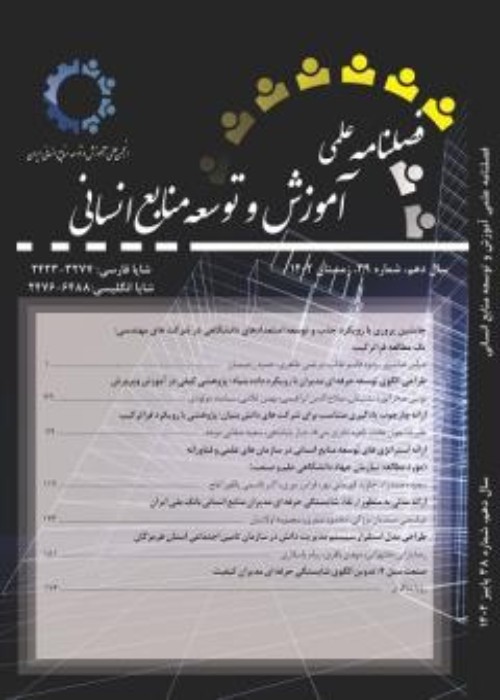Assessing the Current Situation of Training Courses and Providing a Qualitative Model for Improving the Effectiveness of training courses (case study: State Tax Organization)
Author(s):
Abstract:
This research tried to assess the situation of training courses and provide a qualitative model for improving the effectiveness of State Tax Organization, using a mixed method approach. First, the current situation of training was investigated and training courses were assessed. In quantitative part, statistical population included all state audit assistants, assistants, and lead auditors who were selected by cluster sampling method in the some provinces as research samples. Regarding intended training courses, it was specified to assess tax-training courses which were held for experts in the last two years. To collect data, a researcher-made questionnaire was used. The validity of questionnaire was confirmed by educational experts and by using Cronbachs alpha, reliability was reported equal to 0.96. Data analysis indicated that current situation of training courses need-assessment, goals of training courses, content of training course; instructors of training courses, organizing training courses, assessment of training courses, motivation were moderate. Given the above results and interview with tax experts, the results indicated the major training system damages of State Tax Organization included need-assessment (systematic, non-scientific, non-comprehensive, non-functional, and lack of cooperation of staff in need-assessment), goals of courses (lack of information, general, inappropriate content), content damages (the extent of topics, lack of specified team to formulate content, and theoretical content), instructors (incompetence, improper payment, poor teaching method, and faulty system of selecting instructors), environment and condition of holding courses (poor facilities and equipment, and inconvenient time of holding courses), damages of implementing courses (lack of trainees separation i.e. co-educational system, lack of managers support, time of courses, and non-executive courses), training evaluation (not caring about training effectiveness, unreal assessment scores, and lack of supervisors cooperation regarding assessment), motivation (lack of mechanism to encourage and punish trainees, trainees insufficient incentive, instructors insufficient motivation), cultural problems (supervisors do not believe in training and inappropriate attitude of senior managers to training), manpower(lack of manpower and incorrect use of expertise in training).
Keywords:
Language:
Persian
Published:
Iranian Society for Training and Development, Volume:4 Issue: 12, 2017
Page:
127
magiran.com/p1705533
دانلود و مطالعه متن این مقاله با یکی از روشهای زیر امکان پذیر است:
اشتراک شخصی
با عضویت و پرداخت آنلاین حق اشتراک یکساله به مبلغ 1,390,000ريال میتوانید 70 عنوان مطلب دانلود کنید!
اشتراک سازمانی
به کتابخانه دانشگاه یا محل کار خود پیشنهاد کنید تا اشتراک سازمانی این پایگاه را برای دسترسی نامحدود همه کاربران به متن مطالب تهیه نمایند!
توجه!
- حق عضویت دریافتی صرف حمایت از نشریات عضو و نگهداری، تکمیل و توسعه مگیران میشود.
- پرداخت حق اشتراک و دانلود مقالات اجازه بازنشر آن در سایر رسانههای چاپی و دیجیتال را به کاربر نمیدهد.
In order to view content subscription is required
Personal subscription
Subscribe magiran.com for 70 € euros via PayPal and download 70 articles during a year.
Organization subscription
Please contact us to subscribe your university or library for unlimited access!



